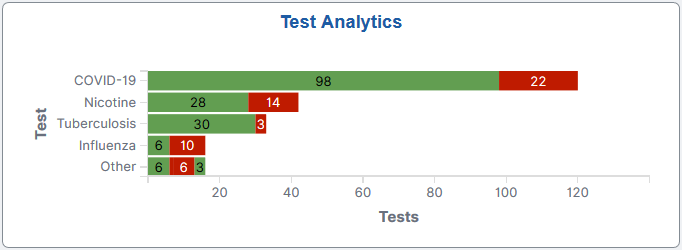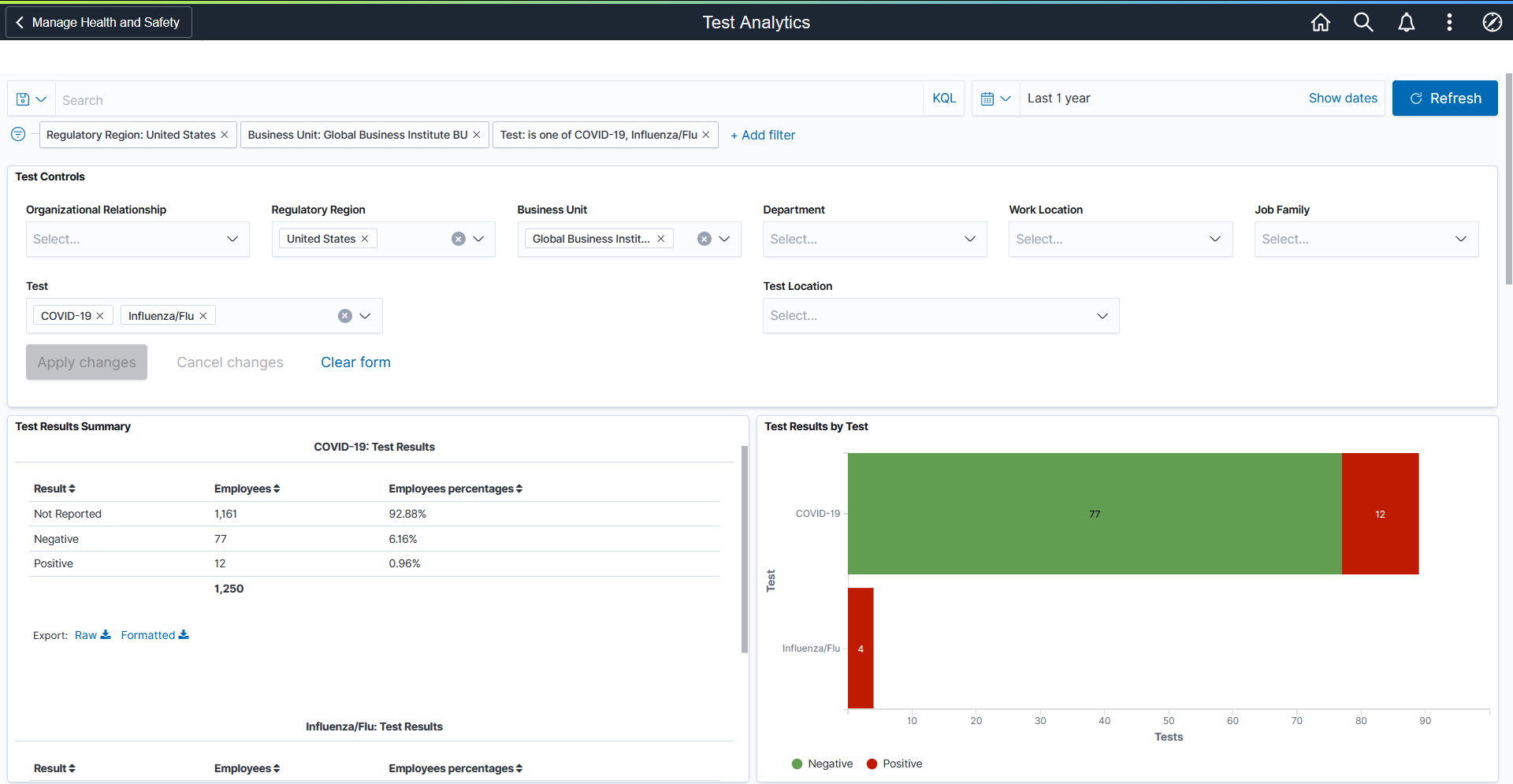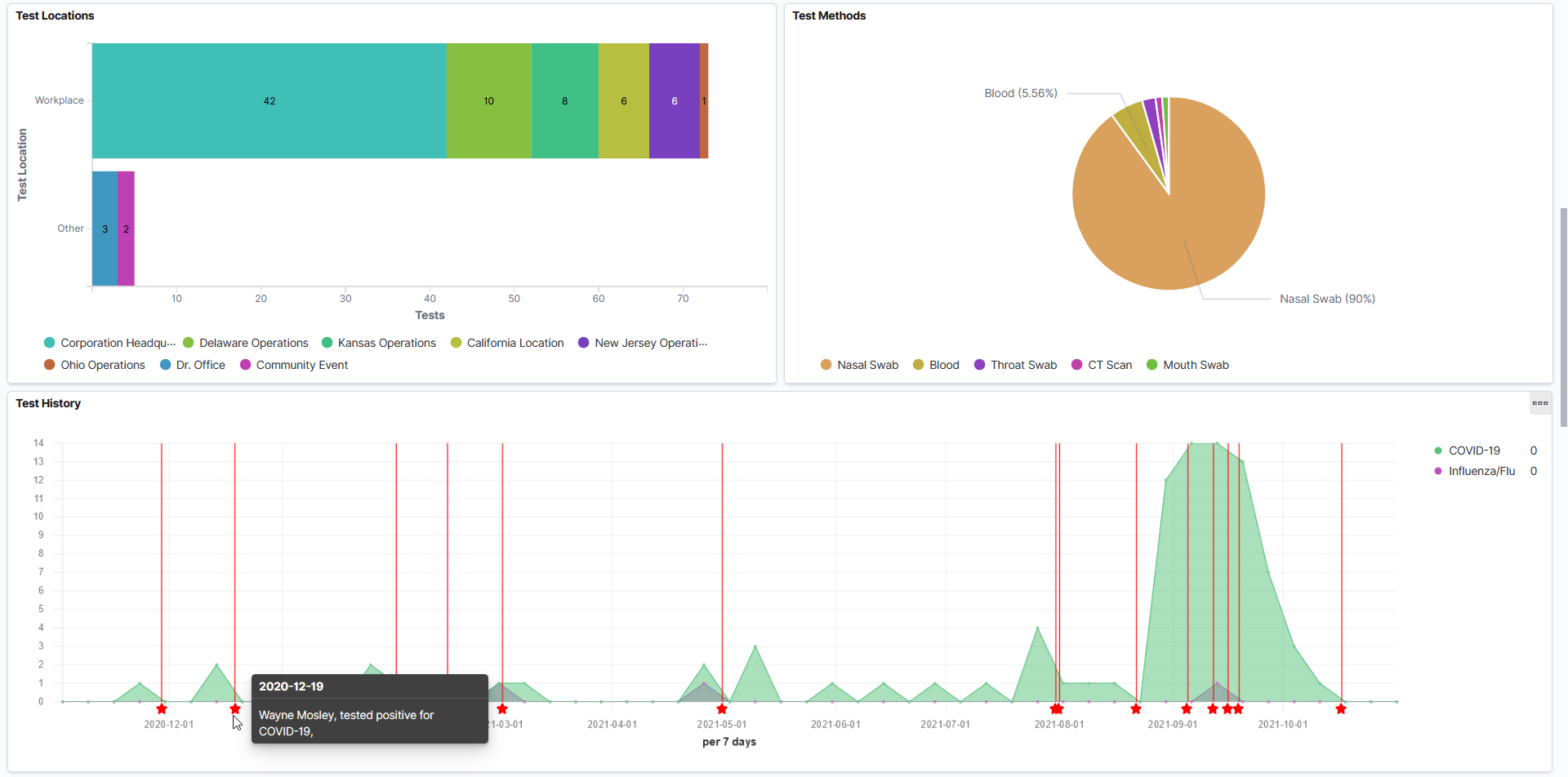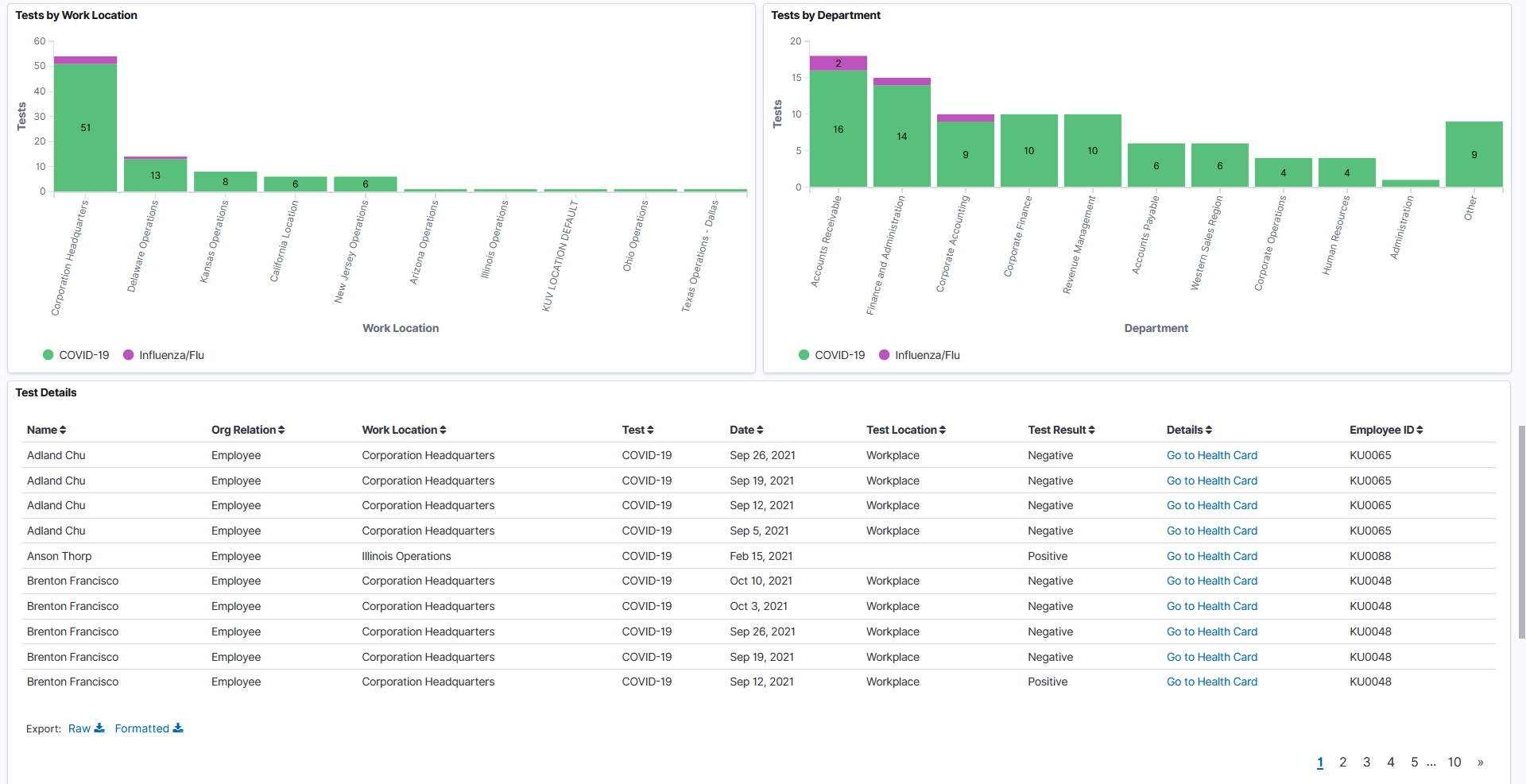Viewing Test Insights
PeopleSoft Test Analytics dashboard provides administrators the ability to view and analyze Health and Safety medical test data using PeopleSoft Insights visualizations.
Based on user privileges, administrators can access visualizations on the Test Analytics dashboard to monitor employees' medical test data and view testing history.
The Test Analytics dashboard is built on the PeopleSoft Insights platform, which relies on an underlying analytics engine and search engine. Medical test data that is visible on the dashboard comes from the HC_HS_EMPL_TEST_DATA search index.
These videos provide an overview of PeopleSoft Insights for Health and Safety:
Video: Image Highlights, PeopleSoft HCM Update Image 37: PeopleSoft Insights for Health and Safety
Video: Image Highlights, PeopleSoft HCM Update Image 40: Employee Wellness
Video: Image Highlights, PeopleSoft HCM Update Image 41: Vaccination and Testing Tracking Analytics
Video: PeopleSoft Vaccination and Test Tracking with Analytics
This topic provides an overview of how to set up the dashboard for test analytics, lists common elements and controls, and discusses the Test Analytics dashboard.
Understanding PeopleSoft Insights
PeopleSoft Insights is an analytical engine that provides visual reports (visualizations) in the form of charts, tables, graphs and so on. The visualizations are based on queries that retrieve data from the PeopleSoft Search Framework.
These videos provide an overview of the PeopleSoft Insights feature:
Video: Insights with PeopleSoft
Video: PeopleSoft HCM Insights
For information on Insights dashboards, see:
PeopleTools Search Technology: "Monitoring PeopleSoft Search Framework and OpenSearch" and "Working with Insights Dashboards for PeopleSoft Application Data" documentation.
|
Page Name |
Definition Name |
Usage |
|---|---|---|
|
HC_HS_TEST_ANALYTICS_FL (this is the cref for the tile) |
Access the Test Analytics dashboard. |
|
|
PTSF_KIBANA_COMP |
Review and analyze medical test data using visualizations. |
Before administrators can access the visualizations for test data, the following steps should be performed:
Deploy the HC_HS_EMPL_TEST_DATA (Employee Test Details) index.
()
Build the HC_HS_EMPL_TEST_DATA search index.
()
Deploy the Test Analytics Tile and Test Analytics dashboard.
()
Note: The full index must be run before the dashboard can be deployed.
Assign these user roles to administrators to access and view Test Analytics visualizations:
Health and Safety ADM Fluid, which provides access to the Test Analytics tile and dashboard.
Health & Safety Administrator, which provides access to medical test data components, allowing users to view medical test data presented on visualizations.
Real Time Index for Test Analytics Visualizations
The HC_HS_EMPL_TEST_DATA (Employee Test Details) search index supports real time indexing (RTI) with PeopleTools version 8.59.13 or higher. When enabled, RTI allows real-time updates to the indexed data that is viewable in test analytics.
For more information about Real Time Indexing, refer to PeopleTools Search Technology, "Administering Real Time Indexing."
This section lists the common elements and controls that are used in Insights analytics.
For more information on working with PeopleSoft Insights and filters, see PeopleTools: Search Technology, "Working with Insights Dashboards for PeopleSoft Application Data” documentation.
Search and Filter Options:
Note: Filtering options apply to all visualizations, which allows users to drill down on all the charts at once.
|
Term |
Definition |
|---|---|
|
|
Click to save the current query text and filters that you want to reuse in the future, or select an existing query to use to update the visualizations. |
|
Search field |
Enter a query to filter data, if applicable. |
|
|
Enter criteria to filter data on the visualizations. You can apply filters in a number of ways:
Added filters are displayed next to the + Add filter link for reference. For example, when you click a bar chart item, such as COVID-19, the filter is automatically added to your filters list, and all visualizations are refreshed to show data pertaining to the COVID-19 test. Click the Change all filters icon for a list of actions that can be performed on all filters, for example, disable them temporarily, remove them permanently, or invert inclusion (show data that does not meet filter criteria). Click a filter item for a list of similar actions that can be performed on it individually. |
|
|
Select a different time period for the analytics. You can enter it manually, or choose from commonly used date ranges provided the system as well as recently used selections. When a new period is selected, all visualizations are refreshed automatically to reflect that change. If you have selected a commonly used date range, for example, This month, or Week to date, click the Show dates link to view the approximate date period in relation to the current date. For example, the current date is November 1 and the selected date range is Year to date. Clicking the Show dates link displays ~ 10 months ago —> now, which indicates that the selected date range started from approximately 10 months ago and ends on the current date. |
|
Organizational Relationship, Regulatory Region, Business Unit, Department, Work Location, Job Family, Test, and Test Location |
Select to filter medical test data using these delivered filter fields. Selections in the Regulatory Region field control the values that are available in the Business Unit, Department, Work Location, Job Family, and Test fields respectively. |
Visualization Options:
When you pause over a visualization, the Options and Legend (if applicable) icons are displayed on the top right and bottom corners respectively. Use them to inspect the chart or table and view the details of that visualization, and toggle the legend display.
|
Term |
Definition |
|---|---|
|
|
Click the Options icon to select one of these options:
|
|
|
Click this icon to hide or display the legend for the chart, if available. You can click an item in the legend to change its color, or add it as a filter (if applicable). |
|
Chart item (bar, pie slice, and so forth) |
Pause over a chart item, such as a bar item or pie slice, to view a summary of details for that item. Select a chart item to add a filter for it to apply to all visualizations. |
Use the Test Analytics tile to access the Test Analytics dashboard.
Navigation:
From the Workforce Administrator home page, select the Manage Health and Safety tile.
The Test Analytics tile is located on the Manage Health and Safety Dashboard.
This example illustrates the Test Analytics tile.

The Test Analytics tile displays the Test Results by Test visualization, which gives a snapshot of the distribution of medical test numbers by test.
Click this tile to access the Test Analytics Dashboard where you can use the visualizations provided to view and analyze Health and Safety medical test data.
Use the Test Analytics dashboard to review and analyze medical test data using visualizations.
Navigation:
Select the Test Analytics tile.
This example illustrates the Test Analytics dashboard (1 of 4).

This example illustrates the Test Analytics dashboard (2 of 4). Pause over a star to view the information of an employee who was tested positive for a test.

This example illustrates the Test Analytics Dashboard (3 of 4).

This example illustrates the Test Analytics Dashboard (4 of 4).

Warning! PeopleSoft Insights dashboards may not render properly if you access them using unsupported platforms.
The Test Analytics dashboard provides a number of visualizations for you to view and analyze employees' medical test data. When you select filters or chart items, or modify the date range, PeopleSoft Insights dynamically updates all visualizations using the source from the index.
The dashboard uses role-level security to display permitted data to the user.
Test Analytics Considerations
Review these points before you begin using the Test Analytics dashboard:
The Test Analytics dashboard displays medical test data for employees, contingent workers, and persons of interest (POIs).
For simplicity purposes, these individuals are collectively referred to as "employees" on the dashboard and in this topic.
The Test Details and Not Reported Details grids can show up to 500 rows of data initially, whereas the charts support the display of more than 500 rows of data.
Use filters to refine the set of medical test data you wish to visualize using this dashboard. For example, filter the data by a specific regulatory region and test.
If a filter field contains multiple values, the drop-down list displays the first 10 values in alphabetical order. To look up additional values, type them in the field manually (case-sensitive).
|
Visualization |
Description |
|---|---|
|
Test Results Summary |
For each medical test selected or included in the Test Analytics dashboard, this visualization displays a data table that shows the breakdown (in number and percentage of the total) of administered tests by applicable test results. Available values include, but not limited to:
Scroll down to view the information for all tests included in the dashboard. |
|
Test Results by Test |
This stacked horizontal bar chart visualization displays the numbers of applicable test results (for example, Negative, Positive, Detected, and Not Detected) by test. |
|
Test Locations |
This stacked horizontal bar chart visualization displays the numbers of administered tests by test location (Workplace and Other) and work location. |
|
Test Methods |
This pie chart visualization displays the percentages of administered tests by test method. |
|
Test History |
This area panel displays the medical test trends by test during the specified time period. Pause over the X-axis to view the numbers of test results by test on a given date on the popup menu that appears. Pause over a star below the X-axis to view summary information of a positive test on the popup menu that appears. Pause over a test in the legend to bring the area of that test to focus. Click a test in the legend to make the area of that test invisible. |
|
Tests by Work Location |
This stacked vertical bar chart visualization displays the numbers of administered tests by work location and test. |
|
Tests by Department |
This stacked vertical bar chart visualization displays the numbers of administered tests by department and test. |
Test Details
The Test Details grid lists employees' medical test data (presented in visualizations) in a tabular format.
|
Field or Control |
Description |
|---|---|
 (Sort column heading) |
Click a column heading to sort grid rows by the column value in ascending or descending order. |
|
|
These filter icons appear when you pause next to a field value. These icons are available for all column values in the grid, and provide a quick way to add filters to the analytics. Click the Filter for value (+ magnify glass) icon to add the shown field value as a filter to all visualizations. For example, if you click to filter for the Workplace test location value, all visualizations will refresh to show data for tests that were administered in employees' workplaces. Click the Filter out value (- magnify glass) icon to remove the shown field value from the filter process for all visualizations. For example, if you click to filter out the Negative test result value, all visualizations will refresh to show data for all tests except the ones that are tested negative. Filters can be removed from the Filters area at the top of the page. |
|
Details |
Click the Go to Health Card link to access the corresponding employee health card in a new browser window or tab. See Health Card Page. Note: If you update the test information of an employee in the health card, you need to rebuild the index for the changes to be reflected in the analytics. However, changes will be updated in the index in real time when RTI is enabled. See the Real Time Index for Test Analytics Visualizations section in this topic for the index that is RTI-enabled for the Test dashboard. |
|
Raw or Formatted |
Click to export data from the grid into a .csv file format. |
Not Reported Details
The Not Reported Details grid lists the information of employees who do not have any test result information for the specified medical test in the system. The status is shown as Not Reported for these employees in the dashboard.
 (See saved queries)
(See saved queries) (Change all filters), and
(Change all filters), and  (Calendar) or
(Calendar) or  (Options)
(Options) (Toggle legend)
(Toggle legend) (Filter for value) and
(Filter for value) and  (Filter out value)
(Filter out value)